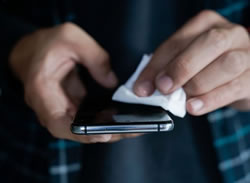 The Commonwealth Scientific and Industrial Research Organisation (CSIRO) has published new research on the ability of the COVID-19 virus to ‘survive’ under various conditions.
The Commonwealth Scientific and Industrial Research Organisation (CSIRO) has published new research on the ability of the COVID-19 virus to ‘survive’ under various conditions.
CSIRO found that SARS-CoV-2, the virus responsible for COVID-19, can survive for up to 28 days on common surfaces including banknotes, glass — such as that found on mobile phone screens — and stainless steel.
The research, undertaken at the Australian Centre for Disease Preparedness (ACDP) in Geelong (Victoria), found that SARS-CoV-2 survived longer at lower temperatures, and tended to survive longer on non-porous or smooth surfaces such as glass, stainless steel and vinyl, compared to porous complex surfaces such as cotton.
It found it also survived longer on paper banknotes than plastic banknotes.
Chief Executive of CSIRO, Larry Marshall said the surface survivability research built on the CSIRO’s other COVID-19 work, including vaccine testing, wastewater testing, personal protective equipment (PPE) manufacture and accreditation, and big data dashboards supporting each State.
“Establishing how long the virus really remains viable on surfaces enables us to more accurately predict and mitigate its spread, and do a better job of protecting our people,” Dr Marshall said.
Deputy Director of the ACDP, Debbie Eagles said the results showed that SARS-CoV-2 could remain infectious on surfaces for long periods, reinforcing the need for good practices such as regular handwashing and cleaning surfaces.
“At 20° C, which is about room temperature, we found that the virus was extremely robust, surviving for 28 days on smooth surfaces such as glass found on mobile phone screens, and plastic banknotes,” Dr Eagles said.
“For context, similar experiments for Influenza A have found that it survived on surfaces for 17 days, which highlights just how resilient SARS-CoV-2 is.”
The CSIRO research report can be accessed at this PS News link.



